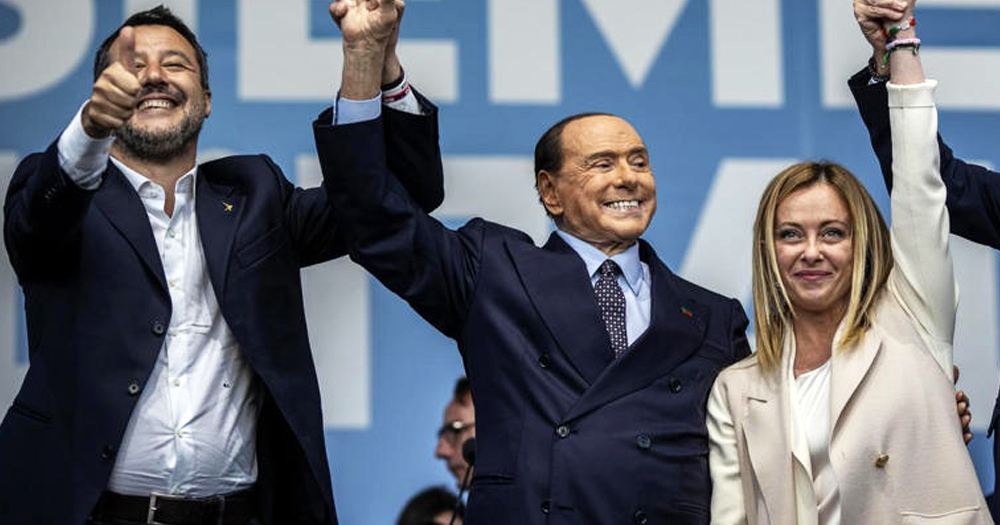Yesterday, September 25, a coalition of far-right parties won the elections in Italy, paving the way to the country’s farthest-right government since Benito Mussolini. Giorgia Meloni, leader of Brothers of Italy, is set to become Italy’s first female Prime Minister, and she has voiced her opposition to LGBTQ+ and reproductive rights on multiple occasions.
Gaining 26% of the votes, Brothers of Italy was the leading party in Italy’s 2022 elections. Meloni’s party, which has neofascist origins and has repeatedly employed anti-LGBTQ+, anti-immigrant and anti-feminist rhetoric during the electoral campaign, gained a strong majority in both Houses of the Italian Parliament, a position that is strengthened by the votes won by the other two parties that form the far-right coalition: Matteo Salvini’s League and Silvio Berlusconi’s Forza Italia.
Italian Head of State Sergio Mattarella is now set to hand Meloni a mandate to form a government, which should be in place at the end of October. She is expected to become the first female Prime Minister in the history of the Italian Republic. Only 64% of Italians went to vote in the political elections, making this the lowest turnout in years.
Because the far-right parties won a strong majority in the Parliament and considered their political allegiances, experts are talking about the consequences their victory will have on the political balance of the whole EU continent. Indeed, the first political leader to congratulate Meloni after her victory was Hungarian Prime Minister Viktor Orbán, who in the past theorised a “political earthquake” in Europe once the far-right managed to conquer Italy.
“In these difficult times, we need more than ever friends who share a common vision and approach to Europe’s challenges.” Orbán said. Earlier this month, Meloni voted against a resolution that condemned Orbán’s Hungary as “a hybrid regime of electoral autocracy”.
Far-right @GiorgiaMeloni is #Italy's first female PM.
It's interesting that #Meloni & others founded her party "Brothers Of Italy" just 10 years ago – now about to take the throne.
After #Mussolini, this is the first Italian government to be headed by a fascist.#italyelections pic.twitter.com/qro7iB4M9d— Frank Huzur (@frankhuzur) September 26, 2022
During her electoral campaign, Meloni employed some of the same narratives used by the Hungarian leader, especially when discussing women’s rights and the LGBTQ+ community. She rallied against a so-called “LGBT lobby” and denounced “gender theory” and a supposed “dominant ideology of the politically correct”.
During one of her public speeches, she used the following words: “Yes to the natural family, no to the LGBT lobby! Yes to sexual identity, no to gender ideology! Yes to the culture of life. No to the abyss of death. Yes to the universality of the Cross. No to the violence of Islam. Yes to safe borders. No to mass immigration. Yes to the work of our people. No to big international finance.”
Meloni was also one of the strongest opponents of DDL Zan, a bill that, if passed, would have protected LGBTQ+ people, women and people with disabilities from discrimination and violence. Members of Brothers of Italy were among those who voted against the introduction of DDL Zan last year, therefore rejecting the bill in the Senate. Meloni herself described the bill as a “law that only aims at introducing a new crime of opinion and to silence those who do not bow”.
"I am Giorgia. I'm a woman, I'm a mother, I'm Italian, I'm Christian". – Giorgia Meloni #italyelections pic.twitter.com/7QlY7oBSHL
— Sachin Jose (@Sachinettiyil) September 25, 2022
According to activists in Italy, the fact that the far-right is going to be in power will mean that reproductive rights, which are already poorly safeguarded, will be weakened even more throughout the whole country. Moreover, marriage equality will now be a distant dream as Meloni voiced her opposition arguing that LGBTQ+ couples “already have civil unions”. The outdated law on gender recognition is unlikely to be reviewed any time soon, leaving Trans folks poorly protected in Italy. Moreover, LGBTQ+ families, which are currently not recognised in Italy, will likely lose the little protections they currently have.
“Meloni has an ambition to represent a model not only for Italy, but for Europe – this is something new [for the right in Italy] compared with the past,” said political theorist Nadia Urbinati, who works at New York’s Columbia University and the University of Bologna. “She has contacts with other conservative parties, who want a Europe with less civil rights … the model is there, and so is the project.”
© 2022 GCN (Gay Community News). All rights reserved.
Support GCN
GCN is a free, vital resource for Ireland’s LGBTQ+ community since 1988.
GCN is a trading name of National LGBT Federation CLG, a registered charity - Charity Number: 20034580.
GCN relies on the generous support of the community and allies to sustain the crucial work that we do. Producing GCN is costly, and, in an industry which has been hugely impacted by rising costs, we need your support to help sustain and grow this vital resource.
Supporting GCN for as little as €1.99 per month will help us continue our work as Ireland’s free, independent LGBTQ+ media.
